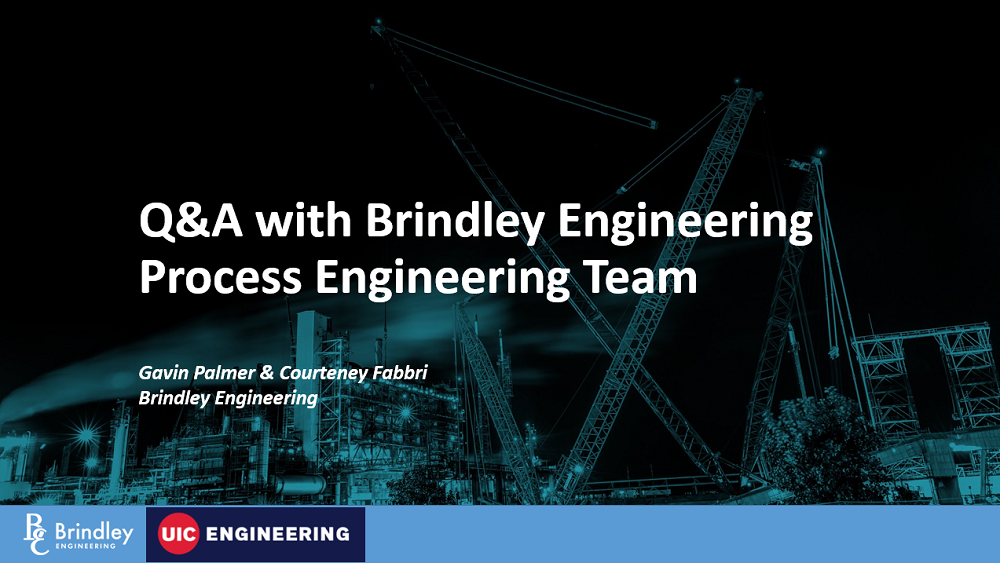Part 2: A Recent Graduate Perspective
In part 1 of this series, you read about Brindley Engineering’s Gavin Palmer (Process Team Lead) and his experience talking to a class of Chemical Engineers at UIC. Now it’s time to hear a new graduate perspective! Courteney Fabbri, who co-spoke with Palmer at the UIC class, graduated from UIC in 2020 with a degree in Chemical Engineering. Fun fact: Palmer served as a mentor to Fabbri and a cohort of her classmates at UIC. This presentation gave a great perspective on the industry and ‘what to expect’ in the real world from both a recent graduate’s perspective and a more seasoned Manager perspective.
Q&A with recent Chemical Engineer Graduate, Courteney Fabbri
Q: In your presentation at UIC you talk about the industry. What value do engineers like you and Gavin and BE bring to the industry?
CF: Brindley Engineering (BE) is a very talented group of recent grads plus a great mix of experienced managers. We are young and competitive, so we are closer to just learning the technical stuff in school and as a result we are more up to date with trends and what is happening in the marketplace. It’s a great advantage.
Something that pulled me to BE as a new grad is the culture at BE. Culture is such a buzz word… But the BE culture is inclusive, which the industry isn’t known for. Inclusive to me means accepting, nurturing, and committed to employee growth. There is patience and incredible soft skills emphasis at BE, which I did not expect transitioning into a technical industry. I have never felt unprepared or unaware as a new employee – I always feel supported no matter what.
Technically we are known for Reliability – making sure infrastructure is sound for many years to come. No mechanical integrity failures. Reliability is huge for BE.
Q: In your presentation you talked about transitioning from college to the ‘real world’. What’s that like for engineers these days?
CF: Like school, the real world requires great communication, especially when a lot of people work from home now a days. Those that are not good at communication will struggle. It’s hard to learn without good communication and that translates to everyday tasks such as responding to emails, calls, attending meetings, client communication, etc… The ability to convey technical concepts to people that don’t have an engineering background is vital. Engineers in general are constantly relied upon be a laments terms “translater”.
Learn email skills! Like most industries, we communicate a lot through emails. It’s important to know how to compose them and to know how to be clear and concise, especially when explaining technical concepts. It’s very easy to confuse a client or coworker if you are long-winded or not organized in your emails. BE supports the training and learning of this medium. There is an art to writing email communication that requires practice and learning.
Q: What advice do you have for in recent grads?
CF: My advice is four-fold:
- Find a mentor! Often times they’ll find you so long as you show you are willing to learn.
- Have a good attitude! It will differentiate you more than you can imagine. People need to know you are easy to work with and reliable. In times of adversity, it’s so important. Showing that you have a good attitude about adversity is really a selling point. Degrees say one thing but it’s hard to quantify someone’s personality… It’s harder to find people who check those boxes.
- Follow up on your applications. You have to stay top of mind to stick out. Being persistent can help a ton.
- Don’t discredit your non-engineering job experience. This definitely counts for something, especially if you’ve been part of a team or even managed one. Learn to leverage this.
Q: Job searching is a two-way street – what should grads look for in BE?
CF: BE is diverse, not only in ethnicities but also age and gender. Try to evaluate diversity across the board in a company to see if they are really practicing inclusivity and not solely advertising it. We have employees from almost every continent in the world and different levels of experience in each department. This is a huge draw for me because it both strengthens our company culture and helps us acquire a vast array of talent. This really gives us an edge.
Q: What is your favorite work story to tell?
CF: My first big outing with BE was at Top Golf and I loved it. We ate dinner together, played games, and just let loose after a busy work week. It goes to show that we know how to have fun outside of the office. That event was a great indication for me that BE provides great work/life balance and encourages us to be ourselves.
Q: What experience have you gotten at BE that you are convinced you would not get at another firm?
CF: Attention to my progress as an engineer. All my managers ask about how I am doing on a personal level and client level at the same time equally. This goes for all levels of management. They care about me professionally and personally. At other companies I don’t’ think you get that personal attention. It means a lot to me, especially starting out.
Enough about soft skills… who wants to see some of these ‘real world’ problems? Here are some samples from the UIC presentation.




To see the execution and more problems for Problem 1 and 2… Contact Brindley Engineering today!
Also, click here to read Part 1: Q&A with Gavin Palmer.


0 Comments